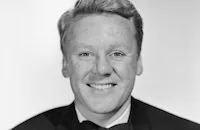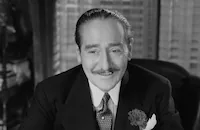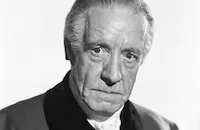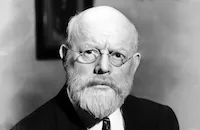State of the Union

Brief Synopsis
Cast & Crew
Frank Capra
Spencer Tracy
Katharine Hepburn
Van Johnson
Angela Lansbury
Adolphe Menjou
Film Details
Technical Specs

Synopsis
Kay Thorndyke is called to the home of her father, newspaper publisher Sam Thorndyke, who is dying. A bitter old man, Sam recounts how the Republican Party betrayed him and that he would be dying in the White House if they had continued to support him. He tells Kay how proud he is of her and her ruthlessness, and reminds her to "make heads roll." After Kay leaves, Sam, tired of his suffering, kills himself. Now the head of the Thorndyke Press, Kay begins the work of grooming her own man for the White House. She meets with Jim Conover, a crusty, back-room political kingmaker somewhat out of favor with his party, and asks him to head the campaign of her handpicked candidate: self-made aviation mogul Grant Matthews, "a rare combination of sincerity and drive that the common herd will go for." Kay also brings in one of her columnists, "Spike" MacManus, a self-described "poor man's Drew Pearson," to be press secretary for Grant. When Grant arrives in Washington, he feigns disinterest in running for president, arguing that he is not a "politician" but a plainspoken American. Despite his honesty, however, Grant is also an ambitious man, which Jim quickly recognizes, and he agrees to test the idea by giving a number of political speeches as he tours the country visiting his airplane factories. Jim tells him that rumors of an illicit relationship with Kay would ruin any chance for the presidency, so they must stop seeing each other. Kay readily agrees, but Grant is reluctant, as he must ask his estranged wife Mary, an idealistic woman, to go on the speaking tour with him. Later, when Jim and Kay are alone, he balks at the idea of running Grant's campaign, until Kay not only offers him the chairmanship of the Republican Party if Grant wins, but a vice-presidential position with the Thorndyke press, as well. Most importantly, both agree that Grant is the type of man they can control. When Mary first joins the campaign, she believes it is an attempt at reconciliation by Grant, but finding Kay's carefully placed glasses on Grant's nightstand, she decides to go home. Learning that Grant is thinking of running for president, an idea she wholeheartedly supports, she then agrees to share the candidate's campaign, if not his bed. While Jim works the political back rooms, making dirty deals in Grant's name, the speaking tour begins with great success. Kay, on the offensive, fires the editors of her newspapers when they refuse to do "anything" to deadlock the Republican convention, Grant's best chance for the nomination. In Wichita, Grant, under Mary's influence, makes his own controversial speech, instead of one of Spike's carefully prepared ones. In Detroit, Grant plans another speech, this time attacking management, but Jim arrives and tells Grant such a speech will end his chances for the presidency. Grant is undeterred until he meets secretly with Kay and agrees to make the prepared speech. After Detroit, Grant is a changed man, meeting with all the special interest groups that Jim brings to him and making any deal he can that will get him convention delegates. To formally announce his presidential aspirations, Grant prepares an elaborate national broadcast from the Matthews' Long Island home. To deflect rumors, Mary is forced to invite Kay to the broadcast, which is the same night as the Matthews' wedding anniversary. When some of the politicians attempt to renegotiate their deals with Grant, Kay steps forward and shows that she is the real power behind the campaign. Mary, finding out that Kay was in Detroit and realizing the role she has played in Grant's campaign, gets drunk and announces that she will not make her speech. Kay quickly agrees to make the speech for her, while Spike warns Mary, whom he has come to admire, that if Kay gives the speech, she will lose Grant forever. At the last moment, Mary steps up and begins the speech. Grant, seeing how Mary's compromise of herself is a mirror of his own actions, can take no more. He stops Mary and proceeds to attack all the politicians who supported him, saying that he is no better because he played both sides and lost his faith in both the people and himself. After the speech, Grant and Mary reconcile, as Kay and Jim leave, looking for another "candidate."

Director

Frank Capra
Cast

Spencer Tracy

Katharine Hepburn

Van Johnson

Angela Lansbury

Adolphe Menjou

Lewis Stone
Howard Smith

Charles Dingle
Maidel Turner

Raymond Walburn

Margaret Hamilton
Art Baker

Pierre Watkin
Florence Auer

Irving Bacon

Charles Lane
Patti Brady
George Nokes

Carl "alfalfa" Switzer
Tom Fadden
Tom Pedi
Rhea Mitchell
Boyd Davis

Howard Mitchell

Arthur O'connell
Robert Skelton
Drew Demarest
Barry Regan
Ed Randolph
Ralph Montgomery
Jim Lennon
Ted Stanhope
Charles Sullivan

Edward Kane
Philip Harron
Sam Finn
Lew Davis
Bert Davidson
Henry Sylvester
Netta Packer
Sig Frohlich

Marion Martin
Tor Johnson
Eve Whitney
Ellen Ross
Stanley Andrews
Dave Willock
Russell Meeker
Frank L. Clarke
David Clarke
Del Henderson
Edwin Cooper
Davison Clark
Francis Pierlot
Brandon Beach
Sam Ash
Charles Meakin
Frank Pharr
Frank Austin
Fred Miller
J. Courtland Lytton
Henry Russell
Norma Brown
Fred Datig Jr.
Ann Beck
Mahlon Hamilton
Robert Spencer
Helyn Eby-rock
Jesse Graves
Garry Owen
Judy Brent
Frank Mayo
Art Howard
Don Anderson
Al Hill
Eddie Phillips
Jerry Schumacher
Joe Gilbert
Ed Randolph
Herschel Graham

Roger Moore
Lew Smith
Gene Coogan
Douglas Carter
Charles Sherlock
Wilson Wood
George Barton
Harry Anderson
Charles Colean
Stanley Price
Fred Zendar
Jack Boyle
Franklyn Farnum
Maurice Cass
Thornton Edwards
Marshall Ruth
Bert Moorehouse
David Bair
Tim Hawkins
Peter Wooten
Crew
Arthur S. Black Jr.
Frank Capra
Myles Connolly
Jack Dawn
George J. Folsey
Cedric Gibbons
A. Arnold Gillespie
Sydney Guilaroff
William Hornbeck
Irene
Emile Kuri
Urie Mccleary
Douglas Shearer
Anthony Veiller
Anthony Veiller
Victor Young

Videos
Movie Clip




Trailer
Hosted Intro




Film Details
Technical Specs

Articles
State of the Union
Capra was still recovering from the financial failure of It's a Wonderful Life (1946), which he had produced with his own company, Liberty Films. RKO, who had financed It's a Wonderful Life refused to put up the money for State of the Union, even though Capra wanted Gary Cooper for the male lead. After RKO's refusal, Capra learned that Spencer Tracy was interested so he went to MGM, who agreed to finance and release the film. In addition to Tracy, Capra could have Van Johnson and Angela Lansbury, two of their contract players. The leading lady would be Claudette Colbert.
As Capra wrote in his autobiography, The Name Above the Title, disaster struck on the Friday before filming was to start. Colbert suddenly appeared in his office and told him that an important clause had been left out of her contract. Her brother, who was also her agent, and her husband, a doctor, always made sure that Colbert had a quitting time of 5pm written into every contract. Capra refused to redo the contract or slow production down with only a seven-hour shooting day, so Colbert was out of the picture. Her costumes had already been made and tested and with two days before shooting, Capra was left without a leading lady. He called Spencer Tracy to tell him the news personally and Tracy told him that not only was Katharine Hepburn not currently working, "But the bag of bones has been helping me rehearse. Kinda stops you, Frank, the way she reads the woman's part. She's a real theater nut, you know. She might do it for the hell of it." As Capra wrote, "On the phone, Hepburn wasted no words on contracts or salary or billing. A show was in distress. She was being asked to help. And help she did. Monday morning at nine sharp, we shot our first scene with Tracy, [Adolphe] Menjou, and Hepburn. For many of the cast and crew it was the first indication that Hepburn had replaced Colbert. There were no tears and no jeers. MGM crews were not easily impressed. They, too, had eaten of MGM's Superman spinach. But one man on the set was impressed the director. [...] And when Tracy and his 'bag of bones' played a scene, cameras, lights, microphones, and written scripts ceased to exist. And the director did just what the crews and other actors did sit, watch, and marvel. And the name Claudette Colbert, only days ago synonymous with disaster, now became associated with serendipity."
Off the set, things were not as harmonious. Adolphe Menjou, a staunch right-wing Republican was supportive of the House Un-American Activities Committee, currently investigating supposed Communists within Hollywood, while Hepburn was an outspoken opponent. Menjou said of Hepburn, "Scratch a do-gooder, like Hepburn, and they'll yell, 'Pravda'." This remark angered Tracy who said, "You scratch some members of the Hepburn clan and you're liable to get an ass full of buckshot." Hepburn, in turn, called Menjou, "Wisecracking, witty a flag-waving super patriot who invested his American dollars in Canadian bonds and had a thing about Communists." Consequently, the two did not speak unless absolutely necessary.
Angela Lansbury, then only twenty-two but playing Tracy's 40-something mistress, wrote of her fear at working with two acting giants, "I slithered up to Spencer Tracy in a slinky robe and tried to seduce him while Katharine Hepburn watched us from the sidelines. Somehow I got through it, but under that robe my knees were literally knocking together." She later spoke of Hepburn and Tracy's kindness to her and marveled that Tracy's "greatness as an actor had a lot to do with his own persona. He had an extraordinary understanding of the common man, which he was, and which he always played. He never played the aristocrat. He understood that person he enacted, had a brilliant knowledge of all his reactions and never let his own personal demons intrude on the character."
State of the Union was shot quickly from September 29 December 6, 1947, two weeks before schedule and under the approximately $2,600,000 budget. It premiered at a black-tie event at the Capital Theater in Washington D.C. with President Truman as the Guest of Honor. Capra and his wife were seated in the box with Truman and his daughter, Margaret, but the nervous director could not stay in his seat. Wearing a small lapel pin which identified him to the Secret Service, Capra prowled the lobby, walking up and down the stairs, preferring to listen to the audience rather than watch Truman's reaction because many of the jokes in the film concerned the President. One of the Secret Service told Capra that he knew Truman liked the film because "When he sees something on the screen that really excites him he lifts himself up and down on his seat like a small boy watching a chase. Watch him." Capra wrote, "The picture was coming up to a remark about Truman. I held my breath. On the screen, Menjou brags to Hepburn about Tracy's chances: "He's going to be the next occupant of the White House." Hepburn's answer: "Do Mr. and Mrs. Truman know about this?" sent the President bouncing merrily up and down in his chair, while the whole house rocked and boffed."
Capra feared the press would "crucify" him the way they had over Mr. Smith Goes to Washington (1939), but the reviews were generally positive when State of the Union was released on April 30, 1948. Bosley Crowther of The New York Times wrote "Regardless of partisan reactions-and there are bound to be plenty of those, in view of the frank and intensely topical nature of the yarn-it cannot be denied that this picture which Frank Capra has made from the popular Lindsay-Crouse stage play, is a slick piece of screen satire. If anything, it is sharper in its knife-edged slicing at the hides of pachyderm schemers and connivers than was the original. For Anthony Veiller and Myles Connolly have actually worked into their script even more withering commentary on current issues and compromises than was in the play. And Mr. Capra, whose penchant for lance-busters and reformers has been frequently displayed, has given his most sarcastic treatment to the back-room politicians on the screen." State of the Union went on to gross over $3,500,000, making it one of the most successful films of 1948.
Producer: Anthony Veiller, Frank Capra
Director: Frank Capra
Screenplay: Anthony Veiller & Myles Connolly, based on the play by Howard Lindsay & Russel Crouse
Cinematography: George J. Folsey
Art Direction: Cedric Gibbons, Urie McCleary
Music: Victor Young
Film Editing: William Hornbeck
Cast: Spencer Tracy (Grant Matthews), Katharine Hepburn (Mary Matthews), Van Johnson ('Spike' McManus), Angela Lansbury (Kay Thorndyke), Adolphe Menjou (Jim Conover), Lewis Stone (Sam Thorndyke), Howard Smith (Sam I. Parrish).
BW-122m.
by Lorraine LoBianco
SOURCES:
Capra, Frank The Name Above the Title
Crowther, Bosley "State of the Union, with Tracy and Hepburn, Makes Bow at the Music Hall", New York Times , 23 Apr 1948
Davidson, Bill Spencer Tracy: Tragic Idol
Edelman, Rob and Kupferberg, Audrey Angela Lansbury: A Life on Stage and Screen
Edwards, Anne A Remarkable Woman: A Biography of Katharine Hepburn
Fisher, James Spencer Tracy: A Bio-Bibliography
The Internet Movie Database

State of the Union
Quotes
Oh, that's silly. No woman could ever run for President. She'd have to admit she's over 35.- Mary Matthews
You're the most beautiful plank in your husband's platform.- Jim Conover
It's a small request, but I'd give anything for a good smack on the south end.- Mary Matthews
I haven't enjoyed myself this much since Huey Long died!- Lulubelle
Trivia
Claudette Colbert was originally cast to play Mary. Days before production began, Frank Capra fired her from the film because she refused to work into the evening. Capra then hired Katharine Hepburn after Spencer Tracy suggested her.
'Cooper, Gary' was originally chosen for the role of Grant Matthews.
Katharine Hepburn, Adolphe Menjou, and George Folsey's names are misspelled in the opening credits because the distribution rights were originally owned by MGM, but only for seven years. The rights were then sold to another company who had to create their own opening credits.
Although practically the entire cast and production staff were under contract to M-G-M, the film as seen today does not open with Leo the Lion roaring and the credit "Metro-Goldwyn-Mayer presents". It opens with the Liberty Bell clanging and the credit "Liberty Films presents".
Notes
The original inspiration for State of the Union came from stage and screen actress Helen Hayes. According to M-G-M press information, after meeting the authors during the presidential conventions of 1944, Hayes suggested they write a play about presidential candidates, which they then did in 1945. Opening in November 1945, State of the Union ran over two years on Broadway (765 performances) and won the 1946 Pulitzer Prize. According to M-G-M press information, Capra had sought to film State of the Union after seeing it three nights in a row during its initial Broadway run. Paramount had, however, already made a deal with the authors for the screen rights in March 1946, by which Paramount was required to release the film version before the 1948 presidential conventions. As reported in New York Times on December 29, 1946, Capra's Liberty Films acquired the film rights under a similar agreement to Paramount's: In addition to the release deadline, the authors received $300,000 plus 50% of the gross after production costs were recovered. Further, the screen rights were leased for ten years, not purchased outright.
As announced in Motion Picture Herald, the film was originally planned as an RKO release under Liberty's agreement with that studio, but according to Capra's autobiography, RKO backed away when the prospective budget hit $2,800,000. Modern sources cite RKO's desire to cast Gary Cooper in the "Grant Matthews" role as another contributing factor in their decision. Spencer Tracy was not only Capra's first choice for the role, he was the authors' choice as well. According to an item in Associated Press writer Bob Thomas' column, Tracy happily agreed, saying "I'm getting old and I've never done a picture with Capra." As such, a production and distribution deal was worked out between Liberty and M-G-M, allowing Capra not only the casting of Tracy, but Lansbury, Johnson and Stone, as well as other M-G-M contract players and crews. Recreating her role from the original Broadway cast was Maidel Turner as "Lulubelle Alexander."
Originally, Claudette Colbert was cast in the role of "Mary Matthews" at a salary of $200,000. On the Friday before shooting began, however, Colbert met with Capra about a provision missing in her contract. According to Hollywood Reporter and New York Times, Colbert felt there had been an oral agreement for a 5:00 PM stop time. Capra said there was not and refused to meet her demand. When she refused to relent, Capra dismissed her, even though shooting was set to begin the next Monday and $15,000 worth of Colbert's wardrobe had already been completed. Calling Tracy, Capra was informed that Hepburn might do the part, as she had been rehearsing the screenplay with him. Thus, Hepburn stepped into the role on less than a forty-eight hour notice.
During the film's production, Capra's Liberty Films was absorbed by Paramount Pictures in a complicated stock deal that netted the Liberty partners $5,000,000 in Paramount stock. Thus, according to New York Times, while the film was distributed by M-G-M, the "producer's share" became the property of Paramount. When Capra ended shooting in February 1948, he amazed many by being fifteen days ahead of schedule and $450,000 under budget. In numerous contemporary interviews, Capra credited his lack of financial involvement in the project for this savings, while in later years he acknowledged the professionalism of the cast.
While Capra and his screenwriters were almost completely faithful to the play, minor changes were made. The character of "Sam Thorndyke," for example, was only mentioned in the play. Aerial and outdoor sequences were also added. Second unit photography was done in San Antonio, Texas, as well as Van Nuys and the San Fernando Valley, CA. Lindsay and Crouse had made weekly changes in the play during the Broadway run to keep the play up to date in its political references. As stated in M-G-M press information, Capra hired Bill Henry, a Los Angeles news columnist and president of the Radio Correspondents' Association of Washington, as a political advisor to keep him abreast of such matters. Plans were also made to "wild-track" certain sections of the soundtrack, allowing for different political references to be added to prints sent to various regions of the country.
During shooting, the House Committee on Un-American Activities held its hearings in Hollywood where Menjou, an acknowledged conservative, testified as a "friendly" witness. According to several contemporary and modern sources, Hepburn, a liberal, remained cordial to Menjou when shooting scenes with him but refused to speak to him otherwise. According to an M-G-M News item, prior to the film's release, Capra test-screened the film in four different cities, attempting to get responses to the film from urban, rural, university and female audiences. The film was shown four times in each city, whose identities remain undisclosed.
The film's premiere was held at the M-G-M Capital Theater in Washington, D.C. under the sponsorship of the White House Correspondents Association with President Harry Truman attending. After the 1948 elections, it was argued in Variety that this premiere helped re-elect Truman by making him change his campaign strategy and believe once again in himself, despite the opposition he faced from members of his own political party. Unlike other Capra films, State of the Union was not considered an outstanding critical or financial success, though it managed to place thirteenth on the 1948 box office scroll, acquiring $3,500,000 in domestic rentals. On most prints currently available, both Hepburn and Menjou's first names and director of photography George J. Folsey's last name are misspelled in the opening credits. Modern source credits also include Edwin B. Willis as a set decorator along with Kuri.

Miscellaneous Notes
Released in United States on Video January 12, 1994
Released in United States Spring April 1948
Released in United States on Video January 12, 1994
Released in United States Spring April 1948














